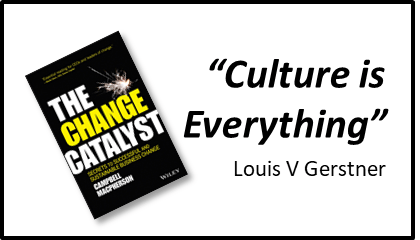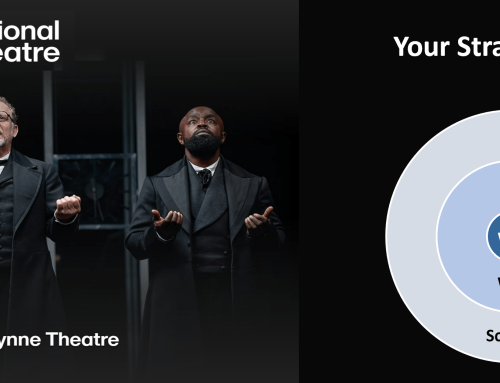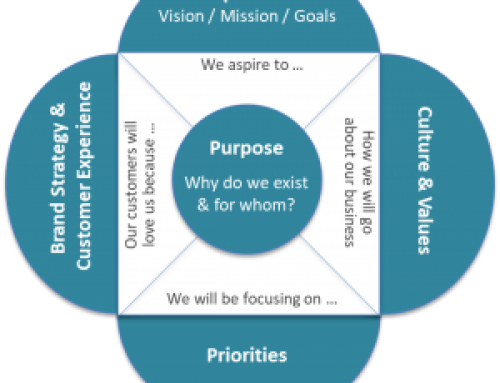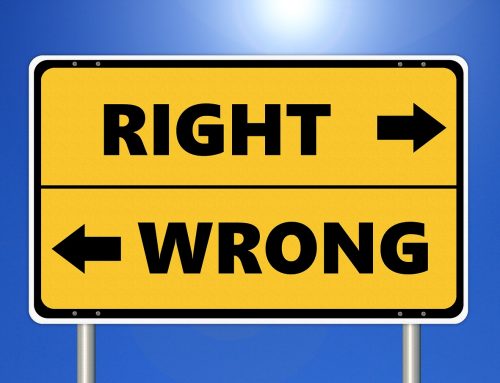It is impossible to transform an organisation without a culture that is ready for change. To thrive in today’s fast-changing world, leaders need to be able to take their organisations in new directions swiftly and decisively – as a reaction to new entrants, changing market conditions, disruptive technologies or new opportunities. To do this, their organisations need to be ready, willing and able to change.
However, when it comes to culture, too many leadership teams kid themselves. They believe they have fostered a culture that values innovation; they believe they have created an environment in which people openly embrace new ways of working; they believe they have developed a culture where people are free to try and fail without fear of adverse consequences … yet the reality on the ground may be quite the opposite.
Confident leaders (or new leaders) realise that their corporate culture may not necessarily be the one described in their annual report.
 The first thing I recommend to my clients is to conduct a Culture Review/ Change Readiness Review (click the link or the image for more details); to ask their employees, customers and partners for an assessment of what their corporate culture really is. Then they can start to fill the gap between reality and aspiration.
The first thing I recommend to my clients is to conduct a Culture Review/ Change Readiness Review (click the link or the image for more details); to ask their employees, customers and partners for an assessment of what their corporate culture really is. Then they can start to fill the gap between reality and aspiration.
“Culture is everything!” declared Louis Gerstner when he was CEO of IBM.
Uber is just the most recent in a long list of companies to discover the truth of this statement. Transport for London has fired a warning shot across Uber’s bow in its initial decision not to renew Uber’s operating licence – purely because of the way the organisation has behaved. It appears that addressing the regulator’s concerns about customer safety and allegations of assault was not regarded as an important part of the Uber culture. If they wish to remain operating in London, their culture will need to change. This latest blow to Uber comes on top of allegations of sexism in their head office and poor treatment of drivers in many cities around the world. The customer experience may be brilliant but Uber seems to have all-but-ignored the other stakeholders of the ecosystem in which they operate. This is about to change.
The number one priority of Uber’s new CEO, Dara Khosrowshahi, is to transform Uber’s culture – because your culture is what determines how, or indeed if, your people deliver your strategy.
One of the most disturbing definitions of “culture” came from Bob Diamond when he was CEO of Barclays Bank. In 2011, he defined culture as “how your people behave when they think no-one is watching”. This was shortly before he was forced to step down due to allegations of Libor rate fixing. More recent leaders of that bank have since been charged by the Serious Fraud Office for a new set of misdemeanours. Meanwhile their competition has been found guilty of money laundering, complicity in Libor fixing, non-compliance with sanctions, PPI mis-selling, interest rate swaps mis-selling and of course overseeing a sales-at-all-costs culture that brought much of the Western world to its knees in 2008.
In 2014, a survey from The Intelligence Unit of The Economist concluded that “53% of financial services executives believe that career progression at their firm will be difficult without “flexibility over ethical standards”.
Culture is, indeed, everything.
And never more so than when it comes to change. As readers of The Change Catalyst and regular readers of this blog will know off buy heart, change is inevitable. Successful change, however, is not. 88% of change initiatives fail.
The barriers to successful change are numerous and none stronger than the fact that people simply don’t like change.
‘Fear of the unknown’ is an innate humane survival instinct. We are a tribal species, quick to adopt an ‘us v them’ mentality at the slightest of provocations. As leaders of change, we need to understand this and proactively enable our people to break down the walls and work constructively with other parts of the organisation.
‘Fear of failure’ is arguably an even stronger change barrier in the business world. As change leaders, we must construct an environment where failure is treated as a learning experience. Our people need to be confident enough to take a risk for the betterment of the organisation.
‘Fear of blame’ is also very common. Improvement suggestions can arrive with a hint of blame aimed at those currently responsible. We leaders need to remove this blame completely.
The ‘lure of victimhood’ is also very strong. When change is done to you, a normal reaction is to slide into the insidious role of victim. Someone in victim mode feels powerless, blaming others for the situation in which they find themselves. Worse still, they feel powerless to act. Change leaders need to help them that they are not powerless, that how they react to the changes are completely within their control.
Change leaders must be able to help their people overcome these fears – if they wish their next change, merger, acquisition or strategy to be among the 1 in 8 that succeeds.
A change-ready culture is one where:
- People are encouraged to question the status quo
- People are encouraged to look for new ways of working
- People are encouraged to embrace new ways of working
- Failure is treated as a learning opportunity rather than an excuse for punishment
- No-one is blamed for the way things currently operate
- Communications are genuine, multi-faceted and involves listening
- Change is regarded as a normal part of life.
Is your culture ready for change?
To find out more about our Culture Review, Embracing Change Workshop and Leading Change Workshop, email campbell@changeandstrategy.com












